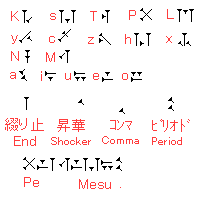Kau aTo
 |
Kau aTo ConLang "Kau aTo" was created as the UnderGround-people's Language, for a story which was written by me. |
What's Kau aTo?
 This language was constructed with a story of the underground.
This language was constructed with a story of the underground.There is stuffy air, voices are reflected.
We need clear voices. So, Language Kau-aTo became like this.
It has very vowel-ful, childish voices.
Express
To use Alphabets in Kau aTo:a, C, e, h, i, K, L, M, N, o, P, s, T, u, x, y, z
C = ch
x = sh
z = ts
UpperCased letters may change into the "Shocker-Sound"( = thick sound).
Pe = [pee] (Normal, General Persons)
Pe^ = [beieee] (Shocker-Sound, 2nd Person)
We modeled this language after Computer-Program language.
One Command word (a verb with pronoun) dominates few Object words.
Command word has not Pronoun. The sound indicates own Person.
Example:
I don't know how to learn to this language.
→There is a way to learn this language, & I don't know (it).
→→Pa xiya o Kau aTo Pa o Mu, a Na yo Pa i.
"Pa" = there is ∼, this, that, It is an Unchangeable word.
"xiya" = way, road, route, program
"o" = of, about, preposition of Present Participle.
"Mu" = eat, drink, learn / "a" = Conjunction, but no meaning.
"Na" = not, don't no, makes the Verb into Participle.
"yo" = things, matters / "i" = have, know
"Kau aTo" has just one way of the sentence.
[ Command word (Verb) ] - [ Object waords (object, complement, adverb) ]
※Adjectives are put after Nouns.
I love you.
→ Ko zi. ("Ko" = feel like, want / "zi" = you(acc.))
I go to school.
→ Tu ToLo^.
("Tu" = go, move / ToLo^" [dorrouo:] = to the group, mass)
Who are you?
→ zi xu? ("zi" = you (are) / "xu" = wh-words)
You ate some food?
→ Mu^ NiTa? or Pa NiTa Mu?
("Mu^" [mbuou:] = you eat, learn, there is no Tense.)
("Pa NiTa Mu?" = There is some food eaten (by you)?)
What are you doing?
→ Pe^ xu? ("Pe^" [beie:] = you do)
I don't understand what you talk me.
→ Pa suLu zi, a Na yo Pa Ni.
( = There is your voice, & there isn't the matter (I) heard)
Will you learn this strange language?
→ Pa Kau aTo uCu, a Mu^?
("uCu" = unknown, formless)
You wait for me!
→ zi^ Ca^!
("zi^" [tsiei:] = you exist / "Ca^" [jwa:] = complement "me")
Mo za o PaKa^.
→ (it) turns out (some) water from the ceiling.
(3rd-Person Transitive Verb ≒ Intransitive Verb)
("o" + Shocker = from, out of)
Pa MaKa Lo, a Mo KaMiNi.
there is God, & create(d) (the) world.
Mo PaKa a aNo Lo.
create(d) ceiling(sky?) & earth.
Na yo aLuPa Ka^ KaMiNi.
no things-all in (the) world.
Pa MaKa Lo, a u "Mo PiTa!"
there is God, & say(said) "(I) create light!"
a, Pa PiTa. Pa MaKa Lo, a Ko yo Pa.
& there is light. there is God, & feel like matter-that.
Pa yaLa. a, Pa PiTa KoNe.
there is darkness. & there is light-next(new).
"MaKa Lo" = head-great → God
"Mo" = to create from nothing
"PaKa" = ceiling (there is not sky in the Underground)
"aNo Lo" = stone-great → earth
"Ka^" [gwa:] = at(in, on, to) the place (complement)
"KaMiNi" = great caven, world (in the underground)
"aLuPa" = all, "10" as number
"u" = to say, talk, call
"PiTa" = light, day
"yaLa" = darkness, night
"KoNe" = next, new
If Subject is 3rd-Person, you must pronounce it, before the contents.
 LeftSide, Original Kau aTo letters.
LeftSide, Original Kau aTo letters.In COM, we write in Latin alphabet.
Don't Warry.
Shocker is a mark of Sublimate sound, called "Shocker-Sound".
There are no Numbers. And, they know numbers 1 to 5, only.
Kau aTo Viewer
(Test on I.E 5 Over only)
(Test on I.E 5 Over only)
HOME